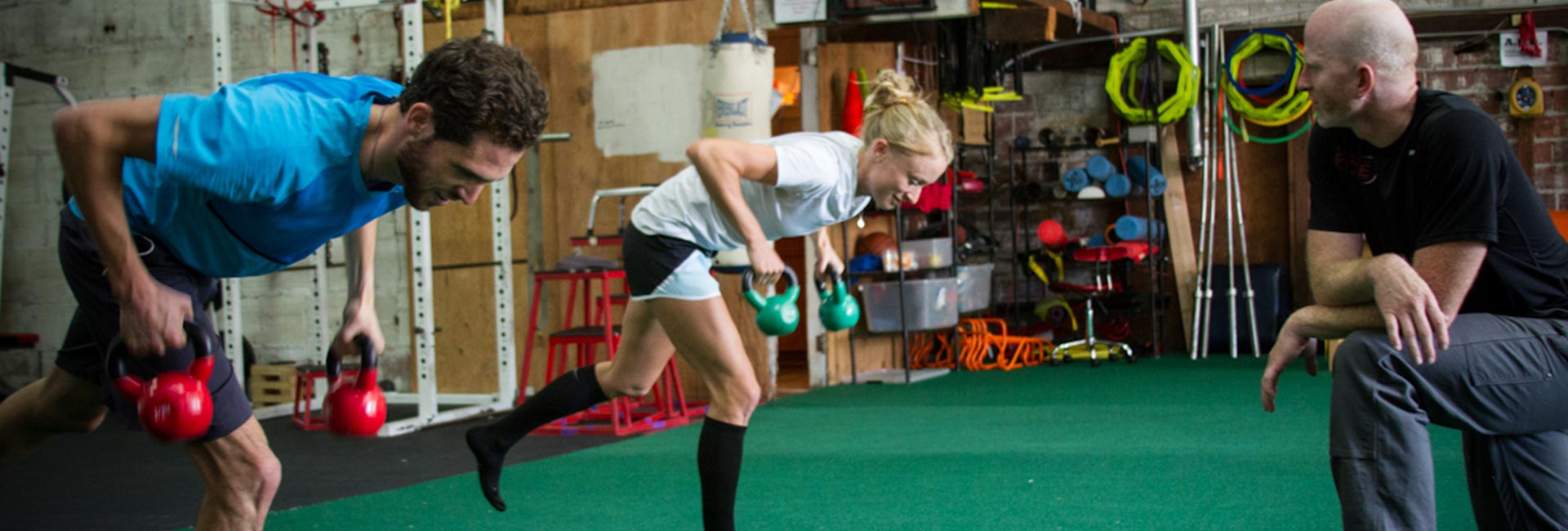Key exercises that keep some of the world’s best runners healthy.
Published in Running Times (Feb/Mar 2013)
As the head strength and conditioning coach, physical therapist David McHenry is tasked with keeping 2012 Olympians Mo Farah, Galen Rupp, Dathan Ritzenhein and Matthew Centrowitz healthy.
Every week, McHenry puts each of them through three individual sessions targeting their deep rotator muscles in their core, hips and glutes that running often neglects. McHenry has adapted the most common exercises he puts his Olympians through, into exercises that runners of all levels can do and benefit from.
The following exercises are to be performed 3-4 times per week.
Hot Salsa
Step into a wide lunge and reach a weighted ball as far out in front of you toward the ground as you can. Keep the back as straight as possible. Shift your weight forward on your front foot. While keeping the ball forward, lift your back leg off the ground and rise up to a perfect running position. Ritzenhein deserves credit for naming this exercise because he says it makes your butt sore the next morning. Perform 10 total lunges, 5 on each side.
Runner Pulls
Balance on one leg and grab a pulley system or elastic band in front of you with the opposite hand. Raise the free knee up toward your waist while simultaneously pulling the weight down 90-degrees and rotating toward your opposite leg. These should only be undertaken after the you have mastered the previous drills, as any lingering hip or core weakness or control deficiency will reinforce the wrong movements here 15 times on each side.
Side Plank Knee to Chest
Begin in a side plank. Let your shins rest on a BOSU ball and balance on the ground using your lower arm. Keeping your body level to the ground, drive your top knee toward your chest while moving your upper arm back in a running motion. If your left elbow is on the ground, your right knee will move forward in a “high knee” position and the right arm will swing behind parallel to the ground. The motion recruits the core, scapular stabilizers and muscles down the leg. Repeat on the opposite side. If you are doing a static hold, work up to 45 seconds each. If knee drive or hip dip knee drive, work up to 12 on each side.
The Reverse Clam Shell
These may feel like they’re the same as the clamshell, but they control the hip in a different way. Whereas the clamshell opens on the front side of the body, this exercise opens on the backside. Lie on one side with your knees bent and your lower legs behind you at a 90-degree angle. While keeping your knees together, lift your top foot away from the bottom foot as high as you can, hold it for a two-count and then bring it back down slowly. The target muscle is the deep internal hip rotators. Perform 1-2 sets of 15-20 repetitions each.
The Clamshell
Lie on your back and bend your knees to 90 degrees, keeping your feet on the ground. Then hold that position and roll onto your side. Keeping your feet together and your femurs slightly in front of the midline of your body, lift the top knee away from the bottom knee using the glutes to drive the action. The upper foot will turn down to “stand” on the other foot and the motion will engage the external hip rotators. Perform 1-2 sets of 15-20 repetitions each.
Mountain Climbers
Drop to a plank position with your forearms on a mediumsized stability ball. Keeping your core tight, bring a knee to the ball. Try to keep the ball and torso as steady as possible. Alternate knees to the ball throughout the exercise. The movements integrate every muscle used during a stride. Perform 20-30 total.
Runner Touch
Strike a pose in perfect running position with one leg in high knee position. Balancing on the one leg, bend at the hip and touch the toe that’s on the ground with the opposite hand while the leg in the air rotates under and back. Make sure the standing leg remains stable and as straight as possible while enabling you to touch the ground. Be sure to prevent the moving knee from crossing midline while that leg straightens out behind you. Come back up to running position quickly without losing balance, pause for a second or two, and repeat. Switch legs and repeat. Perform 1-2 sets of 8-10 repetitions each.
The Jane Fonda
Lie on your side and place your bottom hand behind your head. Put your top hand on your upper hip pressing your pelvis forward to make sure it does not rotate back during the exercise. Use your core muscles to stay steady. Keeping the top leg straight, lift it up and then back using your glutes to lift the leg. By keeping the outside of your foot level to the ground, you should feel the fatigue in your gluteus medius. Perform 1-2 sets of 15-20 repetitions each.

